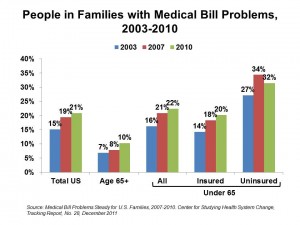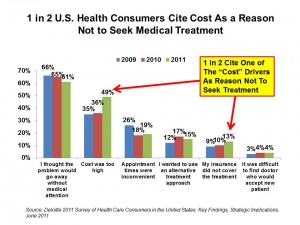 Over 20% of U.S. families had problems paying medical bills in 2010 — about the same proportion as in 2007. The Center for Studying Health System Change found this datapoint “surprising,” given the Great Recession of 2008 that lingers into 2012. However, HSC points out that the leveling of medical bill problems may be a “byproduct” of reduced medical care utilization; in Health Populi-speak, self-rationing of health care.
Over 20% of U.S. families had problems paying medical bills in 2010 — about the same proportion as in 2007. The Center for Studying Health System Change found this datapoint “surprising,” given the Great Recession of 2008 that lingers into 2012. However, HSC points out that the leveling of medical bill problems may be a “byproduct” of reduced medical care utilization; in Health Populi-speak, self-rationing of health care.
In the Tracking Report, Medical Bill Problems Steady for U.S. Families, 2007-2010, HSC analyzed data from the 2010 Health Tracking Household Survey and discovered that since 2003, the proportion of families facing problems with medical debt grew by one-third, from 15% to nearly 21%. The context of this is a decline in U.S. households’ real incomes in that period. Two-thirds of people with medical bill problems report having problems paying for food, clothing and/or shelter, and one in 4 people with medical debt challenges considered filing for bankruptcy. One in 5 of these people did indeed go bankrupt (5% of people in families with medical debt problems).
While it’s obvious that uninsured people would have problems paying medical bills, the chart shows that people who are insured also have challenges with medical debt: while 31.5% of uninsured people under 65 have medical bill headaches, 20.2% of insured people under 65 do. And, 9% of insured people in families with medical bill problems have unmet medical needs due to costs.
“If wages continue to stagnate and health care costs continue to grow faster than real income,” HSC writes, “the financial burden of health care likely will grow  more acute.”
more acute.”
Health Populi’s Hot Points: Looking deeper into the HSC data for 2010, 17% of people under 65 with employer-sponsored health insurance had medical bill problems. and 20.7% of people over 65 with only Medicare (and no supplemental coverage) had problems paying medical bills.
This illustrates the challenge that even those with insurance have to deal with the high cost of health care and cannot afford to pay their co-share of treatments — copayments, coinsurance amounts, and other out-of-pocket charges contractually agreed by their payors on behalf of their health plans. As wages have stayed flat for the better part of a decade, and health care costs have spiraled at or near double-digits year-on-year, the high cost of health care has resulted in self-denial of services that can be necessary.
The Kaiser Health Tracking Poll has demonstrated this phenomenon over the past three years, as well as Deloitte in their consumer health survey published in June 2011, details shown in the second chart. 1 in 2 U.S. health consumers cites “costs” as a reason not to seek treatment.





 Grateful to Gregg Malkary for inviting me to join his podcast
Grateful to Gregg Malkary for inviting me to join his podcast  This conversation with Lynn Hanessian, chief strategist at Edelman, rings truer in today's context than on the day we recorded it. We're
This conversation with Lynn Hanessian, chief strategist at Edelman, rings truer in today's context than on the day we recorded it. We're